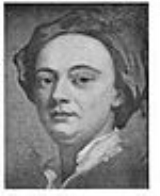
poet
and dramatist and member of the Scriblerus Club
. He is best remembered for The Beggar's Opera
(1728), set to music by Johann Christoph Pepusch
. The characters, including Captain Macheath and Polly Peachum, became household names.
Gay was born in Barnstaple
, England and was educated at the town's grammar school
. On leaving school he was apprenticed to a silk mercer in London
, but being weary, according to Samuel Johnson
, "of either the restraint or the servility of his occupation", he soon returned to Barnstaple, where he was educated by his uncle, the Rev. John Hanmer, the Nonconformist
minister of the town.
So comes a reckoning when the banquet's o'er,—The dreadful reckoning, and men smile no more.![]()
My lodging is on the cold ground,And hard, very hard, is my fare,But that which grieves me moreIs the coldness of my dear.![]()
No retreat. No retreat. They must conquer or die who’ve no retreat.![]()
Life is a jest; and all things show it.I thought so once; and now I know it.![]()
All in the Downs the fleet was moor'd.![]()
Adieu, she cried, and waved her lily hand.![]()
Remote from cities liv'd a swain,Unvex'd with all the cares of gain;His head was silver'd o'er with age,And long experience made him sage.![]()
Whence thy learning? Hath thy toilO'er books consumed the midnight oil?![]()
Where yet was ever found a motherWho'd give her booby for another?![]()
When we risk no contradiction,It prompts the tongue to deal in fiction.![]()

